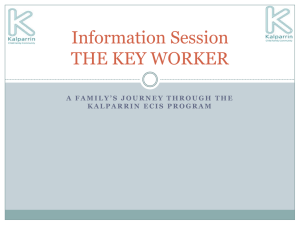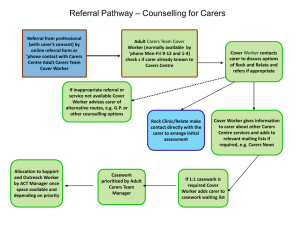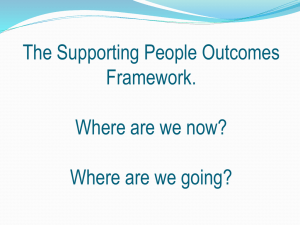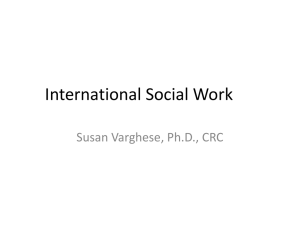Appendix 4 Observation
advertisement
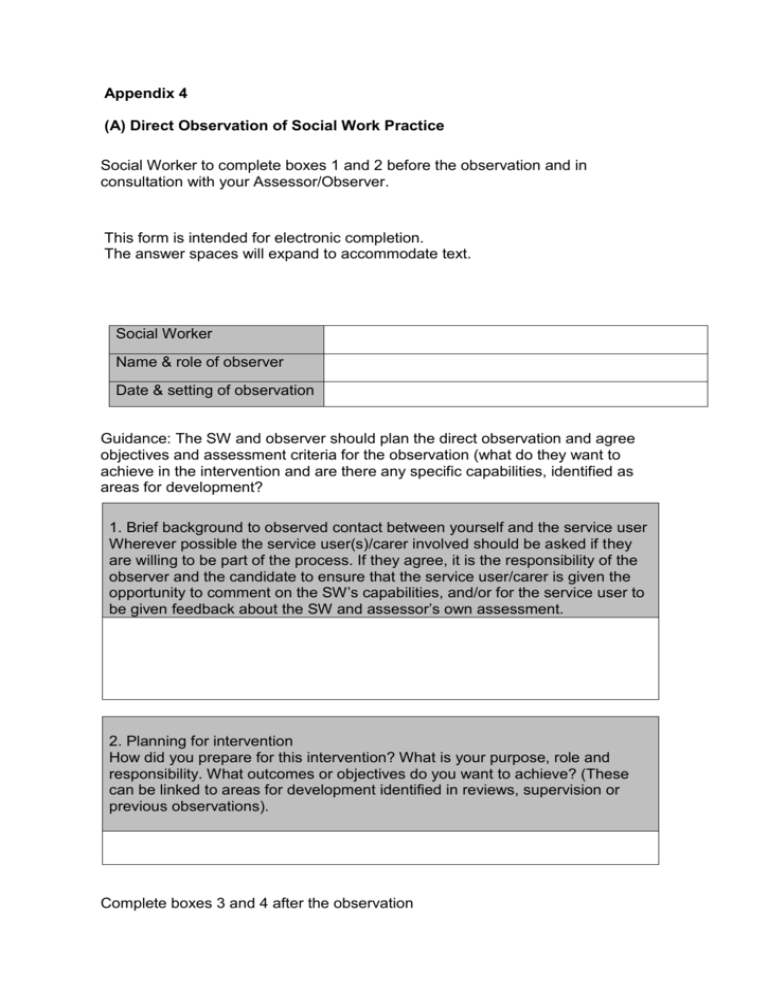
Appendix 4 (A) Direct Observation of Social Work Practice Social Worker to complete boxes 1 and 2 before the observation and in consultation with your Assessor/Observer. This form is intended for electronic completion. The answer spaces will expand to accommodate text. Social Worker Name & role of observer Date & setting of observation Guidance: The SW and observer should plan the direct observation and agree objectives and assessment criteria for the observation (what do they want to achieve in the intervention and are there any specific capabilities, identified as areas for development? 1. Brief background to observed contact between yourself and the service user Wherever possible the service user(s)/carer involved should be asked if they are willing to be part of the process. If they agree, it is the responsibility of the observer and the candidate to ensure that the service user/carer is given the opportunity to comment on the SW’s capabilities, and/or for the service user to be given feedback about the SW and assessor’s own assessment. 2. Planning for intervention How did you prepare for this intervention? What is your purpose, role and responsibility. What outcomes or objectives do you want to achieve? (These can be linked to areas for development identified in reviews, supervision or previous observations). Complete boxes 3 and 4 after the observation 3. Brief description of the intervention Questions you might want to think about: What happened, what was achieved? Describe your role and the action of others. 4. Reflections on the observed practice Questions you might want to think about: What went well? How did you know it had gone well? Were the outcomes achieved? What action do you need to take next in this intervention? How did you feel generally and about being observed? What key points have you learnt from this experience? Were there any surprises for you in this observation? Complete boxes 5 and 6 after reading the observer’s report 5. Critical reflection and professional development Questions you might want to think about: Bearing in mind the SW capabilities and level descriptor, have you identified or confirmed any specific areas for further development? (cross reference to capability statements if required) How do you intend to address these areas of development? What support do you require? 6. Comments and reflections on the feedback given by the observer Social Worker signature: Observer/Assessor signature: Date: (B) Formal Direct observation of Social Worker practice Observer/Assessor to complete after the direct observation Please provide information to support your assessment of the direct observation; reference can be made to the nine domains where relevant. You are not required to make a comment against each domain but can identify strengths and areas for development/concern (including reference to individual capability statements where there are areas of concern). Holistic assessment of the candidate’s capability demonstrated in the direct observation of practice (up to 300 words) Domain 1 Professionalism Social workers are members of an internationally recognised profession, a title protected in UK law. Social workers demonstrate professional commitment by taking responsibility for their conduct, practice and learning, with support through supervision. As representatives of the social work profession they safeguard its reputation and are accountable to the professional regulator. Domain 2 Values and ethics: apply social work ethical principles and values to guide professional practice Social workers have an obligation to conduct themselves ethically and to engage in ethical decision-making, including through partnership with people who use their services. Social workers are knowledgeable about the value base of their profession, its ethical standards and relevant law. Domain 3 Diversity: recognise diversity and apply anti-discriminatory and anti-oppressive principles in practice Social workers understand that diversity characterises and shapes human experience and is critical to the formation of identity. Diversity is multidimensional and includes race, disability, class, economic status, age, sexuality, gender and transgender, faith and belief. Social workers appreciate that, as a consequence of difference, a person’s life experience may include oppression, marginalisation and alienation as well as privilege, power and acclaim, and are able to challenge appropriately. Domain 4 Rights, justice and economic wellbeing: advance human rights and promote social justice and economic well-being Social workers recognise the fundamental principles of human rights and equality, and that these are protected in national and international law, conventions and policies. They ensure these principles underpin their practice. Social workers understand the importance of using and contributing to case law and applying these rights in their own practice. They understand the effects of oppression, discrimination and poverty. Domain 5 Knowledge: apply knowledge of social sciences, law and social work practice theory Social workers understand psychological, social, cultural, spiritual and physical influences on people; human development throughout the life span and the legal framework for practice. They apply this knowledge in their work with individuals, families and communities. They know and use theories and methods of social work practice. Domain 6 Critical reflection and analysis: apply critical reflection and analysis to inform and provide a rationale for professional decision-making Social workers are knowledgeable about and apply the principles of critical thinking and reasoned discernment. They identify, distinguish, evaluate and integrate multiple sources of knowledge and evidence. These include practice evidence, their own practice experience, service user and carer experience together with research-based, organisational, policy and legal knowledge. They use critical thinking augmented by creativity and curiosity. Domain 7 Intervention and skills: use judgement and authority to intervene with individuals, families and communities to promote independence, provide support and prevent harm, neglect and abuse Social workers engage with individuals, families, groups and communities, working alongside people to assess and intervene. They enable effective relationships and are effective communicators, using appropriate skills. Using their professional judgement, they employ a range of interventions: promoting independence, providing support and protection, taking preventative action and ensuring safety whilst balancing rights and risks. They understand and take account of differentials in power, and are able to use authority appropriately. They evaluate their own practice and the outcomes for those they work with. Domain 8 Contexts and organisations: engage with, inform, and adapt to changing contexts that shape practice. Operate effectively within own organisational frameworks and contribute to the development of services and organisations. Operate effectively within multiagency and inter-professional partnerships and settings. Social workers are informed about and pro-actively responsive to the challenges and opportunities that come with changing social contexts and constructs. They fulfil this responsibility in accordance with their professional values and ethics, both as individual professionals and as members of the organisation in which they work. They collaborate, inform and are informed by their work with others, inter-professionally and with communities. Domain 9 Professional leadership: take responsibility for the professional learning and development of others through supervision, mentoring, assessing, research, teaching, leadership and management The social work profession evolves through the contribution of its members in activities such as practice research, supervision, assessment of practice, teaching and management. An individual’s contribution will gain influence when undertaken as part of a learning, practice-focused organisation. Learning may be facilitated with a wide range of people including social work colleagues, service users and carers, volunteers, foster carers and other professionals. Action plan following the direct observation (if applicable) Have areas of development/learning needs been identified? What action needs to be taken to address these? Are they any other outstanding issues? Service user feedback (if applicable) Observer/Assessor signature: Social Worker signature: Date: (C) Informal Direct Observation of Social Work Practice Guidance: These observations may be undertaken by non social work professionals and practitioners and include a range of settings, for example, multi-professional team meetings, case conferences or joint visits. In these cases, the observer completing the template may not necessarily be a registered social worker. The observer will still need to have a basic understanding of what is required of an SW at ASYE level & SW level and should be given the relevant level descriptor before the observation. Social Worker Name & role of observer Date & setting of observation Holistic assessment of the Social Worker’s capability based on this informal observation Please comment on the Social Worker’s capability, taking into account the level descriptor. ASYE level descriptor: “By the end of the assessed and supported first year in practice, social workers should have consistently demonstrated practice in a wider range of tasks and roles, and have become more effective in their interventions, thus building their own confidence, and earning the confidence of others. They will have more experience and skills in relation to a particular setting and user group, and have demonstrated ability to work effectively on more complex situations. They will seek support in supervision appropriately, whilst starting to exercise initiative and evaluate their own practice.” PQP Social Worker Level Descriptor. “They progress to practice effectively, exercising higher quality judgements, in situations of increasing complexity, risk, uncertainty and challenge. Through growing understanding they expect and anticipate, but do not pre-judge, the issues that may develop. They have greater confidence and independence (whilst accessing support when needed), and use their initiative to broaden their repertoire of responses; they have expertise in one or more areas of practice, be familiar with local resource networks and be recognised by peers as a source of reliable knowledge and advice. Observer’s signature: Social Worker signature: Date: (D) Service User/Carer Feedback Different sources of /approaches to feedback: Questionnaire If a questionnaire or feedback form is used, the social worker should think carefully about how and when to use it, ensuring that the design is appropriate to the situation (including the communication needs) of the service user or carer. When thinking about timing, it can be useful to ask service users or carers themselves about when they would prefer to be asked to comment. For example, would they prefer to think about what has happened and respond the following week rather than right away? Direct Observation When an observation of practice is planned, wherever possible the service users/carers involved should be asked if they are willing to be part of the process. If they agree, it is the responsibility of the observer and the social worker to ensure that the service users/carers are given the opportunity to comment on the social worker’s capabilities, and/or for the service users/carers to be given feedback about the social worker and observer’s own assessment. Yes Was the Social Worker punctual, i.e. did they visit on time? Did the Social Worker clearly explain their role and the purpose of their involvement to you? Did the Social Worker make plans with you about the help you wanted and what they would do? Did the Social Worker do what they said they would do? Were you clear about how often the Social Worker would see you and where? Did you find the Social No Any Comments Worker’s contact with you and your family helpful? If you found the social worker helpful, please say in what way: If you found the social worker or any aspect of their work unhelpful, please say why: If there are any other comments you would like to make about the social worker and/or the work they have done, please do so below: Principles for gathering and using service user and carer feedback 1. Service user feedback happens all the time: in an informal way, we are constantly receiving feedback from the people we work with about our interventions, and how people feel about us. Such feedback may be either verbal or non-verbal in character, and we all need to be sensitive to the messages people are conveying to us. Sometimes those messages can come across as angry or upsetting to us – but it is always important to consider what people are conveying and why. Through reflective supervision, students/social workers should be supported to consider these different views, separate out what the adult, young person or child may be trying to convey from how that makes the student/social worker feel, and considering whether the intervention could have been different/more useful had the approach used been different. 2. Service users and carers as ‘partners’ in the observation process: where a formal observation is being undertaken, service users and carers should be asked for their permission prior to the event, and be given information on what to expect during the session. For example; knowing in advance that an observer will be joining the social worker. Some ideas about approaches/questions have been included at the end of this document. 3. Being brave – asking for feedback in difficult circumstances: the people we work with may welcome the opportunity of being asked whether the service/support/intervention they received was helpful and how it might have been improved. Including some way to provide feedback at key transitions points (such as when reviewing, transferring or closing cases) can be very helpful. It can be tempting only to ask for feedback from the people we have the best relationship with; sometimes the best learning can be from those who we experience as most difficult. Additionally, it is important to guard against influencing people to respond in a particular way – there is often a power imbalance between social workers and those they work with, and it is important to be aware of this and consider whether enabling people to respond confidentially will provide a better understanding of the experiences of the child, family or adult you are dealing with. 4. Give choices and take comments ‘on the chin’: the starting point should be asking people directly for their feedback and allowing them space to respond personally and directly if they wish to do so. However, different people will have different preferences about how they would prefer to respond, and providing the option of being able to give (or follow up with) written feedback can be very helpful. 5. Timing! Timing! Timing!: be conscious of the fact that what might feel like the right time for you might not be the right time for the person you are seeking feedback from. If you have just finished a challenging conversation with a couple who want to be able to foster or adopt, the initial response you get might be very different from what they might say at a later date. 6. Focusing on the process, rather than the decision: social workers need to intervene in people’s lives at points of crisis, and rarely meet the expectations or desires of everyone. Because of this, it can be more helpful to focus on the process, and the service user and carer’s experience of it, rather than the decision which they may not be able to change. 7. Getting the style right – communicating with different people: the communication skills and styles needed when talking to a 3 year old are very different from those a 13 year old would appreciate, and different again from those needed when talking to adults. Additionally, issues such as language, culture and disability may affect the ways in which people both understand and react to requests for feedback. 8. Gathering feedback over time: It can be very informative to ask for feedback immediately after a significant intervention in someone’s life, and then return a month or six weeks later to ask more formally about his/her experiences. This provides information about the initial experience, but also allows people to reflect on what has happened and provide a more considered response. However, do remember that what may seem like the ‘right’ time for you may not be right for the person or family you have been talking to. Give people the option of providing feedback at the time or later, and be sensitive to the non-verbal as well as verbal messages you receive about whether ‘now’ is the right time to talk. Remember you are in a position of power and it may feel difficult to say ‘no’ to you. Where the child, family or adult is happy to talk to you straight after the intervention has happened, it can be very informative. Examples could be directly after a Mental Health Act Assessment, or a decision to accommodate a child or young person. Supervision records: These should note whether or not students/social workers record feedback from service users and carers about their work, and should encourage them to regularly incorporate this into their practice, noting how their skills in undertaking this develop over time. Work products and records: Note should be taken as to whether or not there is evidence from any work products that the students/social workers elicit feedback from service users and carers about their work and, if not, encourage them to regularly incorporate this into their practice. Critical reflection: All exercises that students/social workers are asked to undertake should incorporate a specific requirement to reflect on the way/s in which feedback was elicited from service users and carers and the learning derived from this. Useful questions for direct observations: Did the service user understand what to expect during the session? What went well during the observation? What could have gone better? Did you get want you wanted/expected out of the session? What difference do you think being involved in providing feedback made to the service user/carer? For more general feedback from service users and carers at key points of transition: What have you found useful about your work with the social worker? What do you think the social worker might have done differently? What positive things do you hope your next social worker might do? Was the social worker always on time/sometimes on time/never on time? If a problem cropped up that made the social worker late, did someone let you know? Did you feel the social worker listened to you? Did you feel the social worker understood your point of view? Did the social worker help you understand the options available to you/ what might be expected of you/how you could take more control of the situation? Do you feel your situation has improved since being involved with the social worker? Do you feel safer/more in control of your life having worked with the social worker? Questions for the social worker: What surprised you about the feedback? What has been most positive for you about the feedback? How did you feel about the views of the service users/ carers? What might you do about these feelings? How might they impact on your work with these people? What might you do differently as a result of the feedback?


